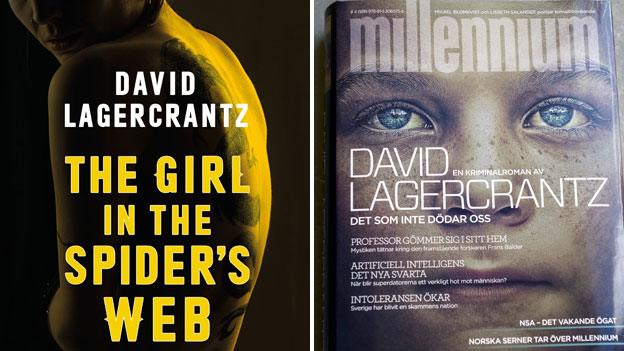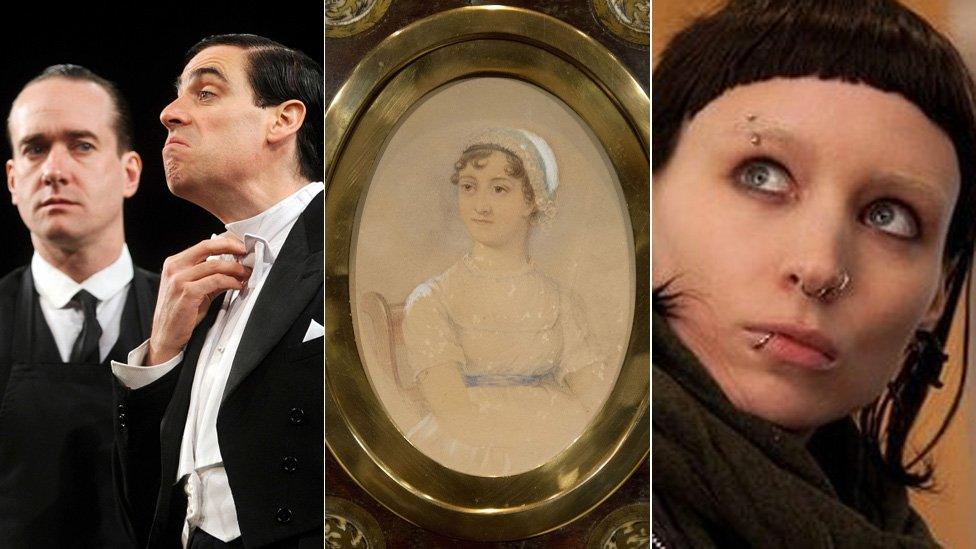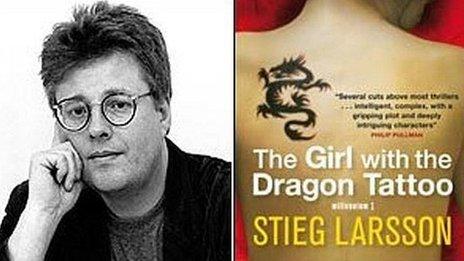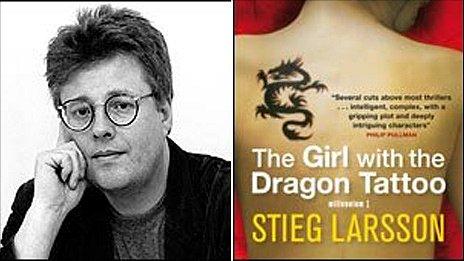Girl in the Spider's Web author says criticism was 'tough'
- Published

David Lagercrantz was announced as the author of the fourth Millennium book at the end of 2013
After months of secrecy, the sequel to the late Stieg Larsson's best-selling Millennium series has been published.
The Girl in the Spider's Web, by David Lagercrantz, continues the story of punk super-hacker Lisbeth Salander which began in The Girl With the Dragon Tattoo.
But, as Lagercrantz explains, writing the new instalment brought with it the pressure of staying true to Larsson's characters and criticism from Larsson's long-term partner.
"There's been so much secrecy about this book, so I'm longing to see what people think," says Swedish writer David Lagercrantz, talking to the BBC just a few days before The Girl in the Spider's Web hit bookshelves around the world.
With more than 80 million copies of Stieg Larsson's Millennium Trilogy already sold, Lagercrantz can be forgiven a few pre-publication jitters.
"I've felt pressure from the start," he admits. "I'm absolutely terrified. But I think the pressure actually made me a better writer. It would be a disgrace if I didn't live up to [Stieg Larsson's] books or at least try my best."
Larsson, who died of a heart attack aged 50 in 2004, did not live to see his novels - The Girl With Dragon Tattoo, The Girl Who Played with Fire and The Girl Who Kicked the Hornet's Nest - become a publishing sensation.
The books were all adapted for the screen - three Swedish films and an American remake of Dragon Tattoo starring Rooney Mara and Daniel Craig.
Despite being with him for 32 years, Larsson's partner Eva Gabrielsson was not entitled to anything from his estate under Swedish law, as they were not married and there was no valid will.
She has been locked in a legal battle for a number of years with his father and brother, who inherited Larsson's estate.
'Idiotic choice'
In December 2013, the estate and Swedish publisher Norstedts commissioned Lagercrantz to take on the characters of hacker and social misfit Lisbeth Salander and journalist Mikael Blomkvist.
In the run-up to publication, Gabrielsson has described Lagercrantz, external as a "totally idiotic choice" and told The Sunday Times, external that the sequel was a "money-making stunt" that would have appalled Larsson.
How has he dealt with the criticism?
"It was tough," he responds without hesitation. "All I wanted to do was to follow my passion and tell a good story. This has been the thrill of my life. The only thing that troubles me and makes me sad is that Eva Gabrielsson and the family haven't reached a settlement about the book.
"She could call me anything, I just have the deepest sympathy for her.
"I know this is good for Stieg's authorship. We are reading him again, he is getting even more iconic. He saw what was coming - back in Stieg Larsson's day the extreme right and the racists were a small group of lunatics. Now they are everywhere."
Has there been any contact with Eva?
"No. She's very angry and I accept that. I'm daydreaming that we will one day have a good conversation about it.
She called me an idiotic choice - well, the readers have to decide.
"She said I'm not like Stieg Larsson, and I accept that. But if you want a copycat the circle would be so narrow."

Details from the UK and Swedish book covers
'Absolutely obsessed'
Born in 1962, Lagercrantz - the son of Swedish author and literary critic Olof Lagercrantz - was a journalist for the national newspaper Expressen before making his debut as an author in 1997 with Ultimate High, the story of Swedish adventurer Goran Kropp, who climbed Mount Everest without oxygen tanks or sherpas.
His other books include Fall of Man in Wilmslow, a novel about British codebreaker Alan Turing, and I am Zlatan Ibrahimovic, the autobiography of the Swedish football star on which he was ghost-writer.
Lagercrantz points out that he has always been interested in characters with a streak of genius who refuse to follow convention. That's what drew him to Lisbeth Salander, to the extent that she began to inhabit his dreams while he was writing the new book.
"I was absolutely obsessed. I was quite terrible to live with. My wife and kids were very kind. I was scared I would do her an injustice.
In the beginning I thought it would be easy to write her. She is such an extreme character. Many people are scared of Lisbeth Salander and so was I. I asked myself all the time: am I worthy?"
Such was the secrecy surrounding the project, Lagercrantz wrote on a computer without an internet connection. Nothing was sent digitally. Even the final proofs were hand-delivered to foreign publishers with individual couriers.
"We used code-words and we didn't email anything," he recalls. "We met in the cellars and things like that.
"The plot was influenced by the National Security Agency and the [Edward] Snowden affair. I was living in the same reality I was writing about. We were quite paranoid all the time.
"I'm a talkative guy so it was hard, but I kept the secrets. There were no leaks, it was extraordinary."
In Sweden the title of the book is Det som inte dodar oss ("What Doesn't Kill Us"). Does he plan to write another Millennium novel? "That we will see. The only thing I know is that I found myself as a writer."
He says offers have been coming in from all over the world which he is discussing with his agent. "One thing is for certain - I won't be Stieg Larsson for the whole of my life. I want to write new books. It's good to be insecure."
The Girl in the Spider's Web (published in the UK by Quercus) is out now.
- Published29 December 2013

- Published19 December 2013

- Published3 August 2011
